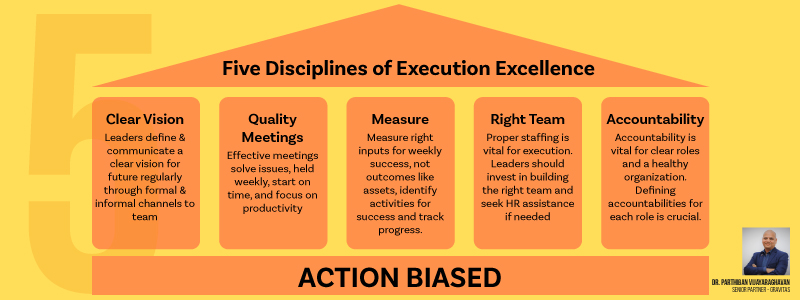The importance of executing business ideas cannot be overstated. Even the best ideas can fail if they are not implemented effectively. Successful firms know how to execute, and business owners need to be proficient at getting things done. In my experience, execution excellence can be achieved by focusing on five key areas:

- Clear Vision: The leaders of the business need to spend time defining a sharp vision for the future, and then communicate this vision regularly with their team. This means more than simply telling the team once; it requires regular and frequent communication through a variety of formal and informal channels, such as team meetings, one-to-one reviews, or informal chats. It is a fundamental mistake by not defining a clear vision for any business. Without a clear direction, many drift from one project to another, without any focus or purpose. They also fail to communicate effectively with each other, and as a result, they are not able to align their efforts towards a common goal. Having a clear vision is essential for any business, as it provides a sense of direction and purpose. Without a vision, a business can quickly lose focus and become directionless, leading to poor decision-making and failure.
- Quality Meetings: Meetings are essential for effective communication within a team. However, meetings need to be well-run and productive, focusing on solving issues rather than simply discussing them. To make meetings work, they should be held weekly, start, and finish on time, and focus on solving issues. Meetings are often disorganized, unproductive, and end up wasting everyone's time. The main issue is having no clear agenda, and discussions often go off-topic. As a result, meetings would drag on for hours and nobody would leave with any clear direction or action items.
- Measure: It is important to measure the right things to determine whether the business is on track or off track. Rather than relying on outcomes such as assets under management or recurring revenue, which are not indicative of weekly progress, businesses should measure inputs that will determine success within a 3–6-month period. This requires identifying the activities that determine success and creating metrics to track progress. If you do not measure your actions and progress in business, you may find it difficult to identify areas for improvement and make informed decisions about the future direction of your business. Without measuring your progress, you may not be able to accurately determine if you are on track to achieve your goals or if you need to update your strategies. This lack of clarity and direction can lead to inefficiencies, wasted resources, and missed opportunities. Additionally, without measuring your progress, it may be difficult to effectively communicate the performance of your business to stakeholders, such as investors or employees. Overall, measuring your actions and progress is essential for effective business management and growth.
- Right Team: Having the right people in the right roles is crucial for execution excellence. Leaders should invest time and energy in getting the right team in place and seek external HR advice if necessary. If you do not have the right team in your business, it can significantly impact the success of your company. The wrong team can lead to poor execution, low morale, and a lack of productivity. To mitigate the risks of not having the right team in place, it is crucial to invest time and resources in hiring and training employees who are well-suited for their roles. This includes creating job descriptions that clearly outline the skills and qualifications required for each position, using multiple hiring channels to find the right candidates, and providing ongoing training and development opportunities to ensure that employees have the skills they need to excel in their roles.
- Accountability: Accountability is essential for ensuring that everyone in the business knows what their key accountabilities are. Defining the key accountabilities for each role within the business can be challenging, but it is crucial for creating a clear and effective organizational structure. A lack of accountability can lead to a number of negative outcomes that can impact an organization's success and overall well-being.
If businesses are not making progress or are feeling frustrated with their team, they should work through these five areas to identify areas for improvement in their execution capability.
About the Author
Dr. Parthiban Vijay Raghavan is an expert in solving an organization's complex problems through accurate diagnosis, designing, innovation, agility, and execution excellence. He is also expertise in Decision Making Process, Leadership Communication, OD, Learning Strategies, and implementation, He is a Certified OB/OD Professional.